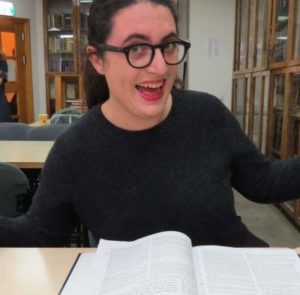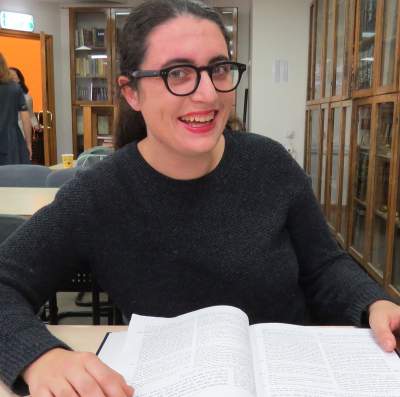“About a year ago, halfway through my final year of college while all of my peers were applying to graduate school and finding jobs, I found myself in the midst of an identity crisis. For as long as I could remember, I thought of myself as student, and faced with the prospect of graduating from a traditional trajectory of education, I didn’t know what I wanted to do. And perhaps more terrifying than that, I didn’t know who it was that I wanted to be. The thought of coming to study at Pardes came to me while I got distracted from a course reading about archeological perspectives on the historical King David by looking at the Books of Samuel in Tanakh, and exclaimed to myself: All I want to do next year is study Torah!
And then, I realiz ed I could, in fact, do that.
ed I could, in fact, do that.
“I’ve been reflecting a lot recently on what it is I was looking for when I came here. On the surface level, I was certainly looking to enrich my Jewish knowledge and Jewish literacy; I didn’t grow up with more than a basic understanding of the five books of Moses, and knew very little of the rest of Tanakh, much less of the Talmud. In college, I picked up a little wisdom from my friends who had Day School educations, and every little bit I learned left me thirsty for more. And yet, this did not just feel like an intellectual exercise. Why did I, a Jew who was not halakhically-observant, and was, at the time, uninterested in becoming halakhically-observant, feel so drawn to Torah?
“It’s only in the past few weeks that I’ve been able to articulate to myself that I think it’s because I’m looking for roots. I’m at a point in my life right now where I’m trying to figure out who it is that I want to be moving forward, and I want that person to feel grounded in something. All the small towns and shetels in the Pale of Settlement where my ancestors lived are gone–or at least the Jewish communities are gone from them, so where is it that I could go to look for roots? The answer seems obvious to me now: the Beit Midrash. Jews have been living in these words, digging into them and debating them and commenting on them and adding to them and living them for thousands of years. And in some ways, it seems that so much of who I am and where I come from comes from this discourse. To engage in it is to engage with my ancestors, and to engage with myself in a radical way.
“I don’t know who exactly I’m going to be when I leave Pardes. I’m not sure the answer lies fully in the text. But I feel so, so blessed to be able to spend this year digging around in it, looking for myself.”
Dani grew up surrounded by warm, pluralistic Jewish community in Squirrel Hill, Pittsburgh, to a family who showed her that Judaism was not only something felt in synagogue, in ritual, or in prayer, but also in how people relate to and build support systems for one another. This stuck with her, and when she moved to Chicago, to attend college at the University of Chicago, she sought to find and help build Jewish communities to continue explore this idea. While pursuing a degree in English Literature (with a minor in Jewish Studies!), Dani found a home at Hillel and the university’s Egalitarian Chavurah, and worked as a Jewish educator at Camp Havaya, the Jewish Reconstructionist Congregation, and the Jewish Enrichment Center.

